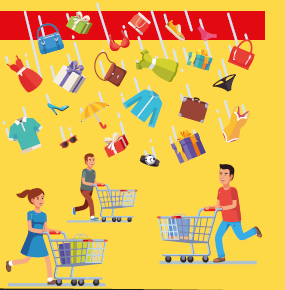What is compulsive shopping and spending?
People who "shop 'till they drop" and run their credit cards up to the limit often have a shopping addiction. They believe that if they shop, they will feel better.
Compulsive shopping and spending generally make a person feel worse. It is similar to other addictions and has some of the same characteristics as alcoholism, gambling and overeating addictions. Compulsive shopping or spending can make a depressed person feel relieved from the depression, anxiety and loneliness during the December holiday season. It also can occur when a person feels depressed, lonely and angry. Shopping and spending will not assure more love or heal the hurts, regrets, stress, and the problems of daily living. It generally makes these feelings worse because of the increased financial debt the person has obtained from compulsive shopping.
How can you tell if you are a compulsive shopper?
Shopaholics, when they are feeling depressed or lonely, go shopping. They go out and buy to feel relieved. Shopping addiction affects more women than men. They often buy things they do not need. Holiday seasons can trigger shopping among those who are not compulsive the rest of the year. Many shopping addicts go on binges all year long and may be compulsive about buying certain items, such as shoes, kitchen items or clothing; some will buy anything. Women with this compulsive disorder often have racks of clothes and possessions with the price tags still attached. They will go to a shopping mall with the intention of buying one or two items and come home with bags and bags of purchases. In some cases, shopaholics have an emotional "black out" and do not remember even buying the articles. If their family or friends begin to complain about their purchases, they will often hide the things they buy. They are often in denial about the problem. Because they cannot pay their bills, their credit rating suffers, may have legal, social and relationship problems. They sometimes attempt to hide their problem by taking on an extra job to pay for bills.
How do you control and treat this condition?
It is recommended that spending addicts seek professional counselling or a self-help group to deal with this problem. Addictive behaviours usually come in clusters, so if you have an eating disorder, a problem with drugs or alcohol, or gambling, you may be a candidate for shopping addiction. Many communities have credit counselling centres that will also help shopaholics.
How do I prevent shopping binges?
• Pay for purchases by cash.
• Make a shopping list and only buy what is on the list.
• Destroy all credit cards except one to be used for emergency only.
• Avoid discount warehouses. Allocate only a certain amount of cash to be spent if you do visit one.
• "Window shop" only after stores have closed. If you do "look" during the day, leave your wallet at home.
• Avoid TV shopping channels.
• Take a walk or exercise when the urge to shop comes on.

